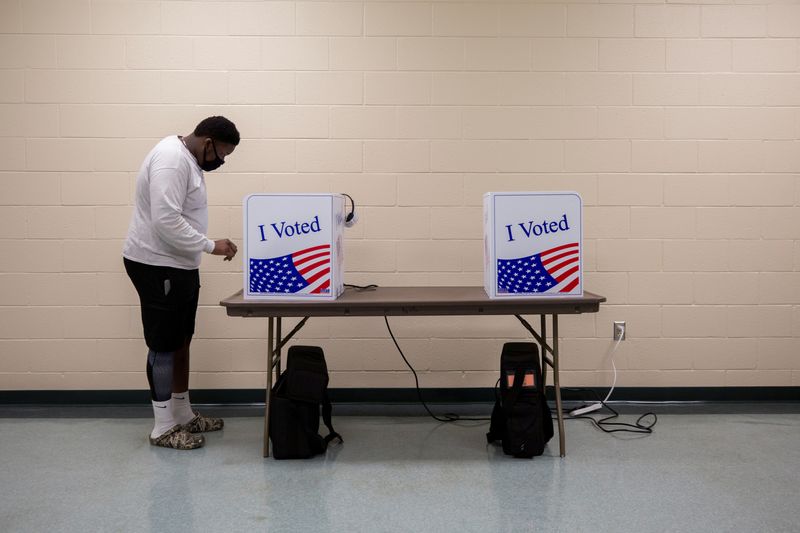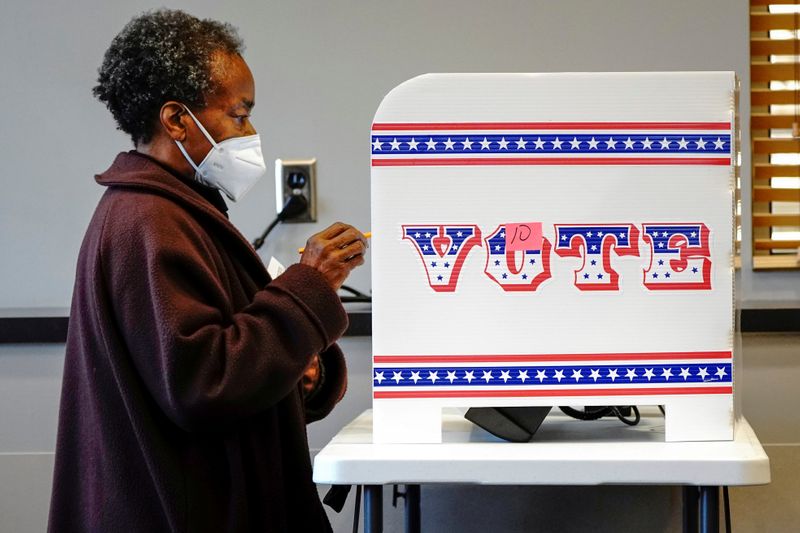By Joseph Tanfani and Michael Martina
(Reuters) - In the historically black neighborhoods of Waco, Texas, the usual get-out-the-vote activities in this presidential election year were upended by the pandemic.
Gone was the all-day party with a DJ and grills full of barbecue at an early voting site at a center that once housed a historically Black college. Organizers toned down the "Souls to the Polls" event that once saw church vans packed with voters and decorated for the occasion. Door-knocking was replaced by 5,000 hangers placed on doorknobs reminding people to vote.
Still, longtime political organizers in the African-American community in this central Texas city said their efforts have gotten a boost from President Donald Trump. He and other Republicans have called for poll monitoring and sought restrictions on mail balloting in Texas and elsewhere this year to prevent alleged voter fraud. Black voters, say residents and activists, have interpreted those actions as an attempt to disenfranchise them. Their response has been to turn out in record numbers in early voting in parts of Waco.
“Based on what I’ve seen, it pisses Black voters off,” said Linda Lewis, director of political engagement for the local chapter of the NAACP, the country's largest civil rights organization. At that former campus in the East Waco neighborhood, 7,571 people had cast ballots in the first two weeks of early voting - more than the 5,155 who showed up in all of 2016, voting records show.
In August, the NAACP launched an initiative to mobilize so-called “low-frequency” Black voters - people who were registered to vote, but who had not voted in the most recent election cycle or several election cycles - in several states with a goal of boosting Black turnout by more than 5% compared to the 2016 election.
In Waco, Lewis and others said they adapted their methods to the pandemic. Instead of the dinner, organizers handed out boxed barbecue lunches. In a city without enough public transportation, some groups are using apps to offer rides to voters. Lewis, 74, is making sure older voters aren’t left behind, arranging single rides in people's cars in an effort she has dubbed “Big Mama’s Lift Service.”
“For Black voters, it’s always been life or death for us,” she said. “But it’s life or death for everybody now.”
African-American voters overwhelmingly back Democrats in U.S. elections, and their turnout will be crucial to the party’s efforts to elect Joe Biden and recapture control of the U.S. Senate. Biden has a 77-point lead over Trump among likely Black voters, according to the latest Reuters/Ipsos poll conducted during Oct. 6-20, which also found that 79% disapprove of Trump's performance in office.
Black voters are already responsible for rescuing Biden’s campaign; the former vice president struggled in early nominating contests this year before scoring a resounding victory in South Carolina, propelled by African Americans familiar with his time at the side of Barack Obama, the country's first Black president. Progressives and Democrats say they aren’t taking anything for granted this year.
On Friday, Kamala Harris, Biden’s running mate, appeared at a historically Black college in Atlanta. On Saturday, Black motorcyclists rallied through the streets of Philadelphia, while Black sororities and fraternities have led ‘Strolls to the Polls’ events in North Carolina. The Biden campaign has sponsored “Shop Talk” events to engage Black men.
“We know as a Black community what is at stake and we are going to show up in historic numbers,” said Ashley Allison, the Biden campaign’s national coalitions director.
At the same time, there are signs of softness in Black support for Biden. Political engagement, which is measured by counting the number of people who say they are "certain" to vote in the election, has been mostly flat among African Americans since March, according to the Reuters/Ipsos polling. And African Americans do not appear to support Biden more than they did Clinton in 2016.
Trump, meanwhile, is looking to siphon enough Black support from Biden to make the difference in battleground states such as Florida. Trump has brashly proclaimed that he has done more for Black Americans than any president since Abraham Lincoln. Some surveys show he has made inroads with Black men and younger African Americans who, in contrast with older voters, like his toughness and anti-establishment message.
Trump has promoted the pre-pandemic economy that saw Black unemployment hit record lows. He has touted his work on criminal justice reform and criticized Biden's support of a crime bill in the 1990s that established harsh penalties for nonviolent drug crimes, which Biden has recently called a mistake.
“For decades, Democrats had made empty promises to the Black community and reaped the benefits of the Black vote without delivering on their words,” said Katrina Pierson, a Trump 2020 senior advisor.
VOTING 'AGAINST ALL ODDS'
Black voters are being courted by an array of political action committees, tech companies that analyze data and progressive groups, along with the traditional efforts led by party committees and churches.
More Than a Vote, a group launched by athletes and artists including Los Angeles Lakers star LeBron James, is offering $15 coupons towards Lyft (NASDAQ:LYFT) rides to arena voting centers in five battleground state cities: Atlanta, Charlotte, Detroit, Houston and Orlando. The group has also teamed up with former First Lady Michelle Obama's "When We All Vote" initiative to provide food, music, protective gear and free legal help in early voting sites.
Yvette Simpson, chief executive of Democracy for America, said the progressive group has used text messages to target 1.7 million mostly Black and Latino voters in 13 battleground states with a simple message: “’Your right to vote is at stake,’” Simpson said. “’We need you to exercise that right against all odds, and here is the information you need to do that.’”
Mobilization groups, however, remain uneasy about the pandemic’s disruption to traditional get-out-the-vote efforts. In Michigan - where a lack of enthusiasm among Black voters for Democratic presidential candidate Hillary Clinton in 2016 allowed Trump to eke out a narrow win - a coalition of organizations launched a drive to register 100,000 voters of color this year. It ended up with just 20,000.
“We usually go door-to-door, canvassing, go to events, go to grocery stores and places that are heavily trafficked to register people,” said Tameka Ramsey, co-director with Michigan Voices, a non-partisan group that participated in the campaign. “None of that really happened.”
In Michigan, 2016 still haunts Democrats. Turnout in Wayne County, which includes Detroit and the largest share of the state’s Black voters, dipped by 37,000 votes that year from 2012. Trump ended up winning Michigan by fewer than 11,000 votes.
This year's early showing points to more engagement. As of Monday, more than 347,000 Wayne County voters had cast ballots, more than triple the figure from the same point in 2016.
BlackPAC, a left-leaning political action committee that tries to mobilize black voters, has relied on a mostly phone campaign since the coronavirus pandemic struck. Making contact has been a challenge, said Adrianne Shropshire, the group’s executive director. But she said voters who answered turned out to be eager for conversation, particularly about the mechanics of mail voting and recent operational changes at the U.S. Postal Service that have slowed delivery.
“I think that was at the height of when people were saying, this is completely outrageous,” Shropshire said.
In North Carolina, where African Americans make up a fifth of the voting population, more than 690,000 Black voters had cast ballots by mail or through early in-person voting as of Oct. 26, according to data compiled by the U.S. Elections Project, an information center based at the University of Florida.
That’s almost equal to the number who voted early in all of 2016, according to data provided by J. Michael Bitzer, a politics and history professor at Catawba College in Salisbury, North Carolina who studies the state’s voting patterns. Trump won North Carolina in 2016, but recent polling averages show a dead heat there.
Early tallies in Georgia, another Southern state with a history of racial barriers to voting, also show Black voter turnout on pace to exceed levels recorded four years ago, according to data from the Secretary of State.
A SURGE IN TEXAS
Fights over voting rules have roiled the country this year, but nowhere more intensely than in Texas, dominated by Republicans for decades. Trump won Texas by nine points in 2016, but recent polls show Trump and Biden in an unexpectedly tight contest.
Texas already had one of the strictest voter ID laws in the country and restricts mail balloting mainly to the elderly and disabled. This year, Republicans fought off Democratic efforts to allow more Texans to vote by mail during the pandemic on the grounds that it would encourage fraud. In addition, Republican Governor Greg Abbott limited the number of drop boxes for mail ballots to one per county, saying he had a duty to “maintain the integrity of elections.”
In Harris County, where about 20% of the 4.7 million residents are Black, County Clerk Chris Collins, an African American, found other ways to expand voting access, namely by opening 120 early voting locations across the county – triple the number from four years ago. Turnout is surging across the county, which includes the city of Houston.
Ida Hammonds, a 72-year-old retired hair stylist in Houston, said she grew up hearing her father’s stories about poll taxes and other methods used to disenfranchise Black voters. Although she qualifies to vote by mail in Texas, she cast an early in-person ballot on Sunday to make sure it would count.

“I think the future of our country, and Black peoples’ place in it, is on the line in this election,” Hammonds said.
(Joseph Tanfani reported from New Jersey and Michael Martina from Michigan. Additional reporting by Brad Brooks from Texas, Tim Reid from Los Angeles and Chris Kahn in New York. Editing by Soyoung Kim and Marla Dickerson.)
